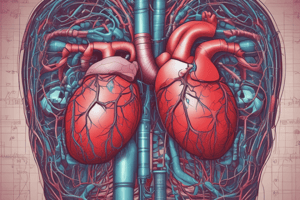Podcast
Questions and Answers
What are the cardiovascular risk factors for atrial fibrillation?
What are the cardiovascular risk factors for atrial fibrillation?
Advanced age, hypertension, diabetes mellitus, smoking, obesity, sleep apnea, intrinsic cardiac disorders such as coronary artery disease, valvular heart disease (especially mitral valve disease), congestive heart failure (CHF), preexcitation tachycardia (e.g., Wolff-Parkinson-White (WPW) syndrome, sick sinus syndrome, cardiomyopathies, pericarditis, congenital channelopathies, atrial myxoma)
What are some noncardiac disorders that can be risk factors for atrial fibrillation?
What are some noncardiac disorders that can be risk factors for atrial fibrillation?
Pulmonary disease (COPD, pulmonary embolism, pneumonia), hyperthyroidism, catecholamine release and/or increased sympathetic activity, stress (sepsis, hypovolemia, post-surgical state, hypothermia), pheochromocytoma, cocaine, amphetamines, electrolyte imbalances (hypomagnesemia, hypokalemia), and drugs (e.g., adenosine, digoxin)
What is the holiday heart syndrome?
What is the holiday heart syndrome?
Irregular heartbeat classically triggered by excessive alcohol consumption, but also sometimes by moderate alcohol consumption, stress, dehydration, or lack of sleep.
What are the effects of chronic kidney disease on atrial fibrillation?
What are the effects of chronic kidney disease on atrial fibrillation?
What are some potential triggers for atrial fibrillation related to stress?
What are some potential triggers for atrial fibrillation related to stress?
Flashcards are hidden until you start studying




